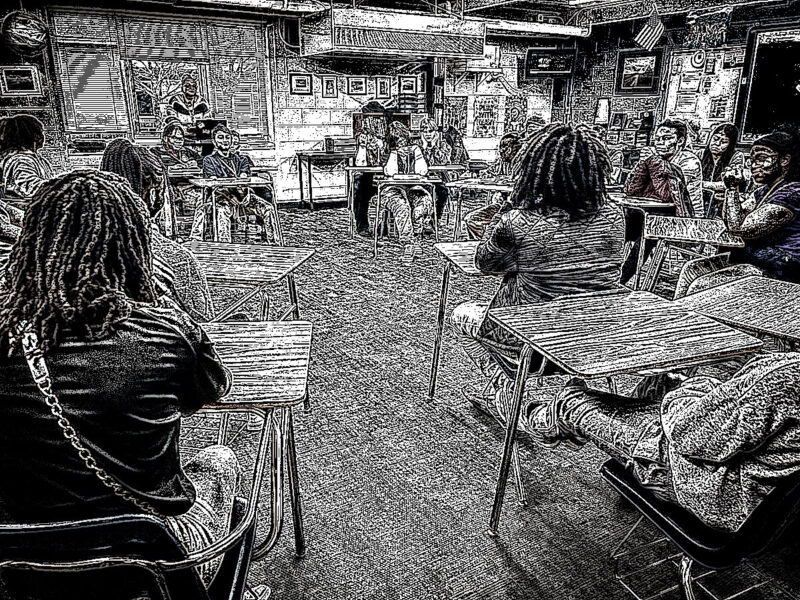Practice
Every morning I have hall duty in the arts wing. On one side is the band; on the other, strings. I walk back and forth between the two, listening to a beautiful cacophony of kids learning music.
A young lady is practicing her violin part. I recognize the melody.
“Do you know what that is? Who wrote it? What it’s called?” I ask with a smile. The boy standing with her is one of my favorite students, but I don’t teach him. He’s on a team down the hall, but he’s a sweet young man who smiles a lot and is friendly with everyone, so we’ve chat a little almost every morning. He glances at the sheet music at the same time she does. I beat them to it, though.
“Edvard Grieg. It’s called In the Hall of the Mountain King.” One of those pieces we all recognize from this or that film or advertisement, but few can identify by name. “Bet you didn’t expect an English teacher to know that, did you?” I laugh. They both agree it was unexpected, then go back to practicing.
Texting
We received a text this morning about some visitors to our school: we would be having district personnel touring, and they are not paying attention to us teachers; they’re looking for what students are doing. In other words, no need to talk to them or anything. I got admittedly a bit snarky and replied,

Usually, when someone on the group text makes a comment everyone likes, hearts and thumbs-up start bouncing all over the place. For this — nothing. Several teachers later said they appreciated my text, but no one felt comfortable expressing it in a way that everyone could see it. I think that speaks to the overall feeling that seems to be sitting like a low, heavy fog, and if I were to guess, I’d say it’s not just our school.
The Visit
Of course, the district personnel come to my classroom. The first one comes accompanied by our principal. Did he guide her here? As soon as they leave, another administrator brings another district person to our classroom.
It was a good day to visit, truth be told. The kids are having a Socratic Seminar — one of their favorite activities. After we’d watched a bit of Harvest of Shame yesterday in preparation for our unit on immigration stories, we transitioned to Harvest of Shame Revisited — a 2010 return to the topic of conditions migrant farm workers face. The common question on the viewing guide was the same: “Why do these folks earn so little money?” So this morning, I decided to change plans. We discussed that. In a limited way. In a South Carolina way.

All the kids discussed how we could do this or do that, but the bottom line was that all their ideas cost money. “Who’s going to pay?” I pointed out there are a couple of sources, but one is we, the people. “They get paid so little because we want cheap food.” That’s true enough, and it led to the discussion I was intending about the necessity sometimes to sacrifice for the good of others.
Left out of the discussion — the elephant in the room for some perhaps — was the exorbitant salaries of CEOs. Where does that money come from? It can come from the consumers, but it can (many say should) also come from reduced CEO salaries or increased taxes on those earning at that level.
But this is South Carolina. And that is socialism. Not really, but it’s going to be labeled Socialism (always with the capital letter) in many South Carolina homes. And that’s at least part of the reason I didn’t even bring that up.
Truth be told, the fact that it might raise some parents’ dander is only part of the reason. To cover this well, I’d need to get a couple of articles for the kids to read about CEO wages compared to employee wages, and this was a spontaneous lesson. I’d decided to do it only this morning after reading yesterday’s responses. But I do take that ugly s-word into consideration.
Such is teaching in South Carolina.
Teaching the Boy
I’ve been reticent to force my own teaching methods and ideas on our kids. L turned out to be a good writer without my help, but E has been struggling a bit. Still, offers of help but nothing more.
Today, he asked for help with his essay. I showed him how I have my students plan and organize their writing, and he found the technique simple and useful. He went upstairs and rewrote his entire essay using my method.
“The essay is so much better!” he gushed.
“That and the fact that you spent two hours in the evening working on it are things you can be really proud of,” I replied.
“Thank you.”
I’ve always oved that about the Boy: when you complement him, he quietly and modestly thanks you for the complement. It has always made me smile.
0 Comments